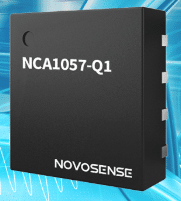Sets a new benchmark for automotive CAN transceivers, offering exceptional performance, rugged protection, and broad compatibility for the most demanding automotive and industrial networking environments.

Novosense has introduced the NCA1057-Q1, a next-generation automotive-grade high-speed CAN transceiver, designed to deliver reliable and high-performance communication between a CAN protocol controller and the physical two-wire CAN bus. Compliant with the latest ISO 11898-2:2024 and SAE J2284-1 to J2284-5 standards, this transceiver supports data rates up to 5 Mbps, making it ideal for applications requiring fast and robust communication, including CAN FD networks.
Built with versatility and safety in mind, the NCA1057-Q1 offers an extensive operating temperature range from -40°C to 125°C and features advanced thermal protection and a TXD dominant timeout function to prevent faults during extended transmissions. Its I/O voltage range supports 1.8V, 3.3V, and 5V microcontrollers, while the device operates reliably within a power supply range of VIO: 1.7V to 5.5V and VCC: 4.5V to 5.5V. The transceiver provides exceptional bus fault protection from -58V to +58V and supports a wide common-mode voltage range of -30V to +30V, ensuring robust performance in harsh automotive environments.
The key features are:
- TXD dominant timeout protection
- Overtemperature protection
- Data rate up to 5 Mbps
- Low loop delay (<250 ns)
Engineered for minimal latency, the NCA1057-Q1 achieves a low loop delay of under 250ns, enabling high-speed and time-sensitive data transmission across CAN networks. It also exhibits ideal passive behavior to the CAN bus when power is off, maintaining signal integrity and preventing interference.Qualified to AEC-Q100 Grade 1 standards and compliant with RoHS and REACH directives, the NCA1057-Q1 is optimized for a broad range of automotive and industrial applications. These include automotive gateways, body control modules, Advanced Driver Assistance Systems (ADAS), infotainment systems, and CAN-based protocols such as CANopen, DeviceNet, NMEA2000, ARINC825, ISO11783, and CANaerospace. It also performs reliably in highly loaded CAN networks, even at data rates as low as 10 kbps.
For more information, click here.







